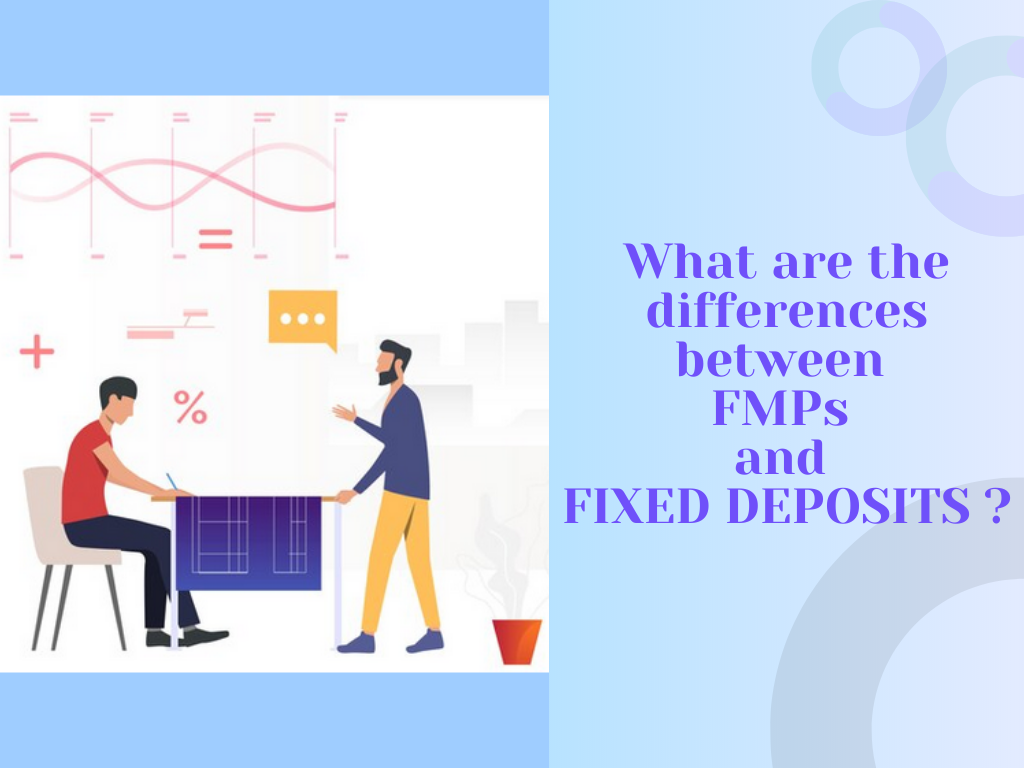What are the differences between FMPs and FIXED DEPOSITS ?
FMPs (Fixed Maturity Plans) and Fixed Deposits are both investment options in India, but they have some key differences. Here's a comparison between FMPs and Fixed Deposits:
Investment Structure:
FMPs: FMPs are mutual fund schemes that pool money from multiple investors and invest in a portfolio of fixed-income securities with a predetermined maturity period.
Fixed Deposits: Fixed Deposits are investment products offered by banks or non-banking financial institutions where individuals deposit a specific amount of money for a fixed period at a predetermined interest rate.
Maturity Period:
FMPs: FMPs have a fixed maturity period, typically ranging from one month to five years. Investors cannot redeem their investment before the maturity date.
Fixed Deposits: Fixed Deposits also have a fixed maturity period, which can range from a few months to several years. However, in certain cases, premature withdrawals are allowed, although it may attract penalties or a reduction in interest rates.
Returns:
FMPs: The returns from FMPs depend on the performance of the underlying fixed-income securities. Investors typically receive regular income in the form of interest payments during the tenure of the FMP.
Fixed Deposits: Fixed Deposits offer fixed interest rates throughout the investment period. The interest rates for Fixed Deposits are determined at the time of investment and are generally lower compared to the potential returns of FMPs. The interest earned is added to the principal amount and paid at maturity or periodically, depending on the chosen payout option.
Risk Profile:
FMPs: FMPs are subject to market risks and credit risks associated with the underlying fixed-income securities. However, since FMPs primarily invest in debt instruments, they are generally considered to have a lower risk profile compared to equity-based investments.
Fixed Deposits: Fixed Deposits are relatively low-risk investments as they are backed by banks or financial institutions. They provide a fixed return, which is not affected by market fluctuations. However, there is a risk of inflation eroding the real value of returns over time.
Liquidity:
FMPs: FMPs have a lock-in period until their maturity date, which means investors cannot redeem their investment before the specified maturity period.
Fixed Deposits: Fixed Deposits may offer more flexibility in terms of premature withdrawals, although it may come with penalties or reduced interest rates.
Taxation:
FMPs: The tax treatment of FMPs depends on the holding period. FMPs held for less than three years are treated as short-term capital gains and taxed at the individual's applicable income tax rate. FMPs held for three years or more qualify for long-term capital gains tax, with indexation benefits.
Fixed Deposits: The interest earned on Fixed Deposits is subject to income tax as per the individual's applicable tax rate. TDS (Tax Deducted at Source) is applicable if the interest income exceeds a certain threshold.
It's important to consider your investment goals, risk tolerance, and liquidity requirements before choosing between FMPs and Fixed Deposits. Consulting with a financial advisor can help you make an informed decision based on your specific financial circumstances.


